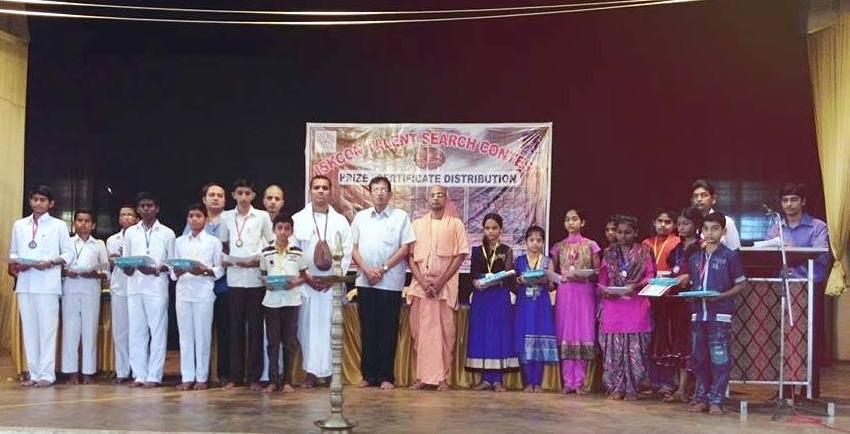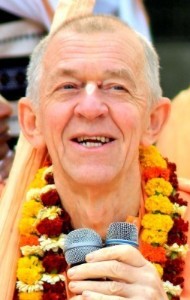Глава 7
Всякий раз, приезжая в Мумбай, я останавливаюсь в доме своего ученика Нароттам Даса Тхакур Даса и его жены Манджари Деви Даси. Сегодня Нароттам отправился со мной в больницу на ПЭТ-сканирование для контроля рецидива рака кожи, хирургически удаленного у меня в прошлом году.
– Что-то я в два раза больше нервничаю, – сказал я Нароттаму, когда мы уселись в зале ожидания. – Что, если рак вернулся? Придется пройти еще через одну операцию и все такое.
– Мы все молимся о вас, – сказал Нароттам.
– Из-за сканирования тоже нервничаю, – сказал я.
– Зачем это? – спросил Нароттам. – Сканирование безболезненно.
– Знаю, – ответил я. – Но у меня мурашки по коже, когда меня укладывают на эту тележку и вкатывают в аппарат. Будто отдают на съедение какому-то монстру.
Я оглядел помещение и увидел санитара, толкающего по полу швабру.
– Только посмотри на этого парня, – проговорил я, – разговаривает сам с собой и сам себе смеется. И так все плохо, а тут еще и он.
– Может быть, он немного ненормальный, – сказал Нароттам.
– Он нормальный, – сказал мужчина рядом с нами, – я здесь часто бываю и всегда его вижу. Он просто эксцентричен.
Санитар прошелся мимо нас, его худосочное тело было в форме цвета хаки, карие глаза бегали из сторону в сторону. Он резко толкал свою швабру, по всей видимости, нисколько не заботясь о пациентах в зале. Было заметно, что и другие им обеспокоены.
– Ну вот, теперь он что-то поет себе под нос, – сказал я Нароттаму, – да еще и фальшивит.
Мужчина, сидящий рядом с нами, рассмеялся.
– По крайней мере, он хорошо здесь убирает, – сказал он, – и у него добрые намерения.
Регистратор за стойкой окликнула санитара:
– Махеш! Отнеси пакет д-ру Агарвалу. Четвертый этаж, кабинет шестнадцать.
Швабра Махеша грохнулась об пол – бросив ее, он поспешил к стойке.
– Да, мэм, – произнес он, – сию минуту, мэм.
Голос у него был высокий, гнусавый. Шагая к лифту, он громко оглашал адрес на свертке.
– Доктор Агарвал, четвертый этаж, кабинет шестнадцать. КрутоОго! Сколько всего для доктора!
Двери лифта закрылись, скрывая его лыбящееся лицо, и я вздохнул с облегчением.
– Эксцентричен – это мягко сказано, – проговорил я Нароттаму. – Ну, по крайней мере, наконец-то тихо.
Однако спустя десять минут двери лифта открылись, и он вернулся.
– Сделано! – прокричал он и, поспешив к своей швабре, снова начал водить ею в своей манере, да еще при этом запел своим пронзительным голосом. Звук был тягостный, но у меня получилось отключиться и подремать насколько минут, пока я не услышал, как в репродуктор объявляют мое имя. Зайдя в смотровой кабинет, я увидел нескольких медсестер и, к своему удивлению, Махеша, деловито расставляющего предметы в медицинском шкафчике. «О нет! – подумал я. – Здесь-то он что делает?»
– Махеш, – сказала одна из медсестер через плечо, – будь добр, отнеси пакет (сверток) доктору Рейнолдсу в 404 кабинет.
Махеш, не говоря ни слова, протанцевал через кабинет забрать пакет. Потом распахнул дверь, театрально отсалютовал и исчез в коридоре.
– Пока мы готовим раствор для вашего сканирования, – сказала мне медсестра, – пожалуйста, наденьте больничную накидку, и когда вернетесь, садитесь в это кресло.
Я вышел в другую комнату, переоделся и вернулся.
– Ай! – сестра ввела мне иглу в вену на запястье. Краем глаза я заметил, что в кабинет возвратился Махеш. Внезапно кресло под моим весом накренилось и стукнулось о столик сестры с медицинским оборудованием. Стеклянная бутылка скользнула к краю, и медсестра, потянувшись ее подхватить, случайно выдернула иглу из моего запястья.
– Махеш! – крикнула она. – Сюда!
Махеш бросился через кабинет, подхватил бутылочку и вернул ее на стол. Медсестра подобрала шприц, оказавшийся на моих коленях.
– Махеш, – сказала она, – подержи, пожалуйста, кресло джентльмена, пока я делаю укол.
– Да, – сказал он с серьезным выражением лица и ухватил кресло обеими руками.
– Ай! – медсестра нашла другую вену. Махеш же наклонился ко мне и, к моему изумлению, начал говорить на беглом английском.
– Сэр, – сказал он, – сегодня у меня очень благоприятный день. Верно, это из-за моих прошлых добрых дел мне посчастливилось послужить садху. Такая редкая возможность.
И он процитировал стих из Падма Пураны:
арадхананам сарвешам
вишнор арадханам парам
тасмат паратарам деви
тадийанам самарчанам
«Моя дорогая богиня, среди всех видов поклонения лучшее – это поклонение Господу Вишну, а лучше этого – поклонение Его преданному, Вайшнаву».
– Что? – оторопел я. – Откуда ты знаешь этот стих?
– Я изучал шастры, – тихо ответил он, все еще удерживая кресло.
– Ты преданный Кришны? – спросил я.
– Когда-нибудь, – сказал он, – надеюсь, что когда-нибудь я стану преданным Господа.
– Ты из семьи Вайшнавов?
– Нет, – ответил он. – Я сирота. Моя семья – это преданные Господа.
И он процитировал стих из Бхагавад-гиты:
мач-читта мад-гата-прана
бодхайантах параспарам
катхайанташ ча мам нитйам
тушйанти ча раманти ча
«Мысли моих чистых преданных сосредоточены на Мне, их жизнь полностью посвящена Мне, и они испытывают большое удовлетворение и блаженство, просвещая друг друга и беседуя обо Мне».
Неожиданно я понял, насколько же я был увлечен его критикой – до того, что не заметил его умиротворенного лица и увлажненных сияющих глаз.
– Сэр, – сказал Махеш, чуть улыбаясь, – когда я увидал вас в приемной, то сердцем почувствовал, что это Господь послал вас, чтобы дать надежду всем тем несчастным, что страдают здесь. Одно ваше присутствие доставляет радость.
Голос медсестры вернул меня к реальности.
– Инъекция сделана, – сказала она. – Пройдите, пожалуйста, в соседнюю комнату и ждите сканирования.
– Да-да, – ответил я. – Но позвольте мне сначала спросить Махеша, если.., – я обернулся к нему, но он исчез.
– Куда он ушел? – спросил я сестру.
– Прибираться, наверное, – откликнулась она, не глядя.
Ожидая в соседней комнате, я ощущал, как на меня накатывает волна стыда. «Я недооценил этого человека, – думал я. – Насмехался над ним про себя, а он больше преданный, чем я. Я совершил серьезное оскорбление. Надо будет попросить у него прощения».
Вскоре на табло высветилось мое имя – подошла моя очередь на ПЭТ. Медсестра пригласила меня и помогла улечься на аппарат сканирования.
– Вытяните руки за голову, – сказал она. – Десять минут вам надо будет лежать совершенно неподвижно.
Я нервничал из-за монстра, но расслабился и понемногу задремал. Очнулся я, когда кто-то коснулся моих стоп. Я услышал голос, тихо напевающий: «Харе Кришна, Харе Кришна, Кришна Кришна, Харе Харе / Харе Рама, Харе Рама, Рама Рама, Харе Харе».
Я открыл глаза – это был Махеш.
– Махеш, – прошептал я, – мне надо с тобой поговорить.
Но он снова исчез так же внезапно, как появился. Сканирование закончилось, и чувство стыда снова накрыло меня. «Да я просто оскорбитель», – думал я, переодеваясь в свою одежду. Я дошел по указателям до приемной, теперь здесь было в два раза больше народа. Подписывая бумаги за стойкой регистрации, я услышал высокий голос поющего Махеша, поднял взгляд – и увидел его, машущего шваброй в глубине холла и пританцовывающего.
Я бросился через приемную.
– Махеш, Махеш! – окликнул я его. – Мне надо с тобой поговорить!
Но прежде чем я до него добрался, он скрылся за стеклянной дверью. Пританцовывая, он удалялся по коридору в другую часть больницы, я же опустился на колени и стал молиться о прощении:
ванчха-калпа-тарубхйаш ча крипа-синдхубхйа эва ча
патитанам паванебхйо вайшнавебхйо намо намах
«Предлагаю свои почтительные поклоны всем Вайшнавам, преданным Господа.
Они в точности подобны древам желаний, которые могут выполнить желания каждого и полны сострадания к падшим обусловленным душам».
[Шри Вайшнава-пранати]
Вставая, я вдруг вспомнил, что нахожусь в переполненном залепомещении. Все смотрели на меня.
«Пусть смотрят, – думал я. – В худшем случае подумают, что я ненормальный, в лучшем – что я эксцентричен. Но я-то знаю, что предлагаю почтение удивительному Вайшнаву, которого мне довелось сегодня повстречать».
***********************
Шрила Прабхупада писал:
«Вы сетуете на то, что встретили в Калифорнии двух моих юных учеников, и Вам показалось, что у них «очень недоброжелательное отношение к людям, с которыми они встречаются». Конечно, мне неизвестны детали этого случая и все его обстоятельства, однако простите великодушно моих возлюбленных учеников, если они проявили некоторую недоброжелательность или обошлись с Вами неучтиво.
В конце концов, полностью отказаться от своего образа жизни ради служения Господу – нелегкое дело, и майя (иллюзорная материальная энергия) особенно настойчиво старается снова поймать в свою ловушку тех, кто отказался служить ей, чтобы стать преданным.
Поэтому, чтобы противостоять натиску майи и оставаться твердыми, несмотря на любые искушения, молодые или неопытные преданные, новички в преданном служении, иногда занимают враждебную позицию по отношению к тем вещам или людям, которые, возможно, могут оказать на них пагубное влияние или повредить их еще не окрепшие ростки преданности.
В этом они могут даже перегнуть палку, только чтобы оградить себя, и потому некоторым непреданным, которые сами еще целиком находятся под властью материальной энергии, майи, они могут иногда показаться нигилистами или пессимистами. Но в сущности этот материальный мир и есть место, полное страданий и опасностей, подстерегающих нас на каждом шагу, он – духкхалайам ашашватам, юдоль смерти, рождений, болезней и старости, пристанище страданий и боли, где все преходяще.
[…] Прийти к этому уровню понимания вещей такими, как они есть, совсем не просто, и о тех, кто достиг его, говорят как о великих душах».
[письмо Шрилы Прабхупады Линни Людвиг, 30 апреля 1973]



 By Sri Nandanandana Das
By Sri Nandanandana Das
 By Bhakti Vigna Vinasa Narasimha Swami
By Bhakti Vigna Vinasa Narasimha Swami
























 By Giriraj Swami
By Giriraj Swami  By Chaitanya Charan das
By Chaitanya Charan das By Mohini Radha Devi Dasi
By Mohini Radha Devi Dasi
 By Radhanath Swami
By Radhanath Swami 